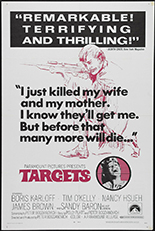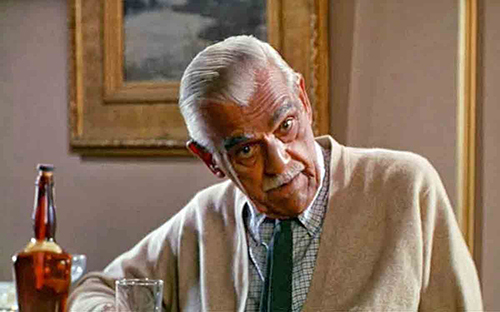
 One of the last features to showcase ailing Boris Karloff and his iconic work, Targets is a long-admired, rarely seen treatise on the old-school way of moviemaking as the new school leads the way. It also predicts, sadly, the way well-armed gunmen will undertake thrill-killing by any means necessary — an entertaining blueprint, if you will.
One of the last features to showcase ailing Boris Karloff and his iconic work, Targets is a long-admired, rarely seen treatise on the old-school way of moviemaking as the new school leads the way. It also predicts, sadly, the way well-armed gunmen will undertake thrill-killing by any means necessary — an entertaining blueprint, if you will.
Targets is also the debut of a kinder kind of director Peter Bogdanovich, long before Tatum O’Neal had a sip of vodka, dating soon-deceased Playboy Playmate Dorothy Stratten and, worst of all, making At Long Last Love. Sorry!
Based on the real-life shootings at the University of Texas at Austin campus by Charles Whitman in 1966, the film is about the unmotivated actions of the personable Bobby (Tim O’Kelly). Those include killing his entire family, shooting at drivers on the highway and then headed for the local drive-in. Meanwhile, horror legend Orlok (Karloff) has decided to quit acting, but shows up at one last event: the premiere of his new picture (depicted with Karloff clips from Roger Corman’s The Terror) at the local drive-in.
Worlds collide when the madman confronts the monster, in a scene that is stilted but emotional, especially knowing the movie uses the basis for workplace and school shootings that continue to thrive in our violent culture. The last 50-plus years have seen Targets become more chilling and downright scary, even if Whitman’s name has been lost to time.
Bogdanovich’s film is incredibly well-made, with a great script and great characters; the duality between Bobby and Orlok is apparent. O’Kelly is terrific as the mild-mannered lad with the brooding veneer of a psycho; it’s the way real killers should act on screen, instead of being a carbon-copy of Charles Manson.
Targets is a wholly engaging picture of a fictionally creative mind against the horror of a psychotic mind. Like Stephen King’s Rage or Judas Priest’s music, it targets the art, the artists and how the diseased mind works, good or bad. Either way, Targets respects the filmic past while it immolates the immediate future. —Louis Fowler

